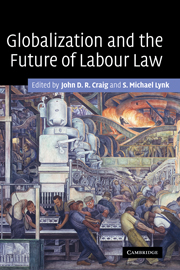Book contents
- Frontmatter
- Contents
- Notes on contributors
- Acknowledgements
- Table of cases
- List of abbreviations
- Introduction
- PART I Perspectives on globalization
- PART II International labour standards
- 3 The impact of globalization on labour standards
- 4 Globalization, decentralization and the role of subsidiarity in the labour setting
- 5 A game-theory account and defence of transnational labour standards – a preliminary look at the problem
- PART III The European Union
- PART IV The Americas
- PART V The ILO
- PART VI Labour rights
- Bibliography
- Index
3 - The impact of globalization on labour standards
Published online by Cambridge University Press: 23 July 2009
- Frontmatter
- Contents
- Notes on contributors
- Acknowledgements
- Table of cases
- List of abbreviations
- Introduction
- PART I Perspectives on globalization
- PART II International labour standards
- 3 The impact of globalization on labour standards
- 4 Globalization, decentralization and the role of subsidiarity in the labour setting
- 5 A game-theory account and defence of transnational labour standards – a preliminary look at the problem
- PART III The European Union
- PART IV The Americas
- PART V The ILO
- PART VI Labour rights
- Bibliography
- Index
Summary
Introduction
The impact of international economic integration on labour standards has occupied an important place in Canadian public debate over trade policy for at least fifteen years. This debate was first ignited by the negotiation of the Canada–United States Free Trade Agreement (FTA) in the late 1980s. Canadian critics of the FTA argued that deeper economic integration with the United States would inevitably lead to a deterioration in working conditions in Canada, as Canadian enterprises faced more competition from less regulated southern states with lower wage rates and levels of unionization. Eventually, the critics argued, economic pressures would inevitably put political pressure on Canadian labour legislation. The conclusion in rapid succession of the North American Free Trade Agreement (NAFTA) and the Uruguay Round of the GATT negotiations, and the emergence of globalization as a focus of public attention, vaulted such concerns to greater international prominence. Increased economic integration with low wage developing countries led to the prospect of a “race to the bottom” in labour standards, an issue which became a topic of debate and research throughout much of the industrialized world, and provided one of the key arguments for linking labour standards and international trade by including a set of binding labour standards alongside or within free trade agreements.
That linkage is now firmly established in North America and concern about the potential impacts of globalization on labour standards remains significant among the package of policy arguments for the trade-labour linkage.
- Type
- Chapter
- Information
- Globalization and the Future of Labour Law , pp. 77 - 107Publisher: Cambridge University PressPrint publication year: 2006
- 5
- Cited by



